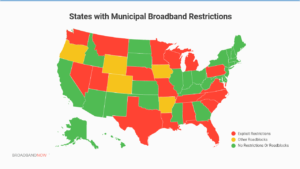Net neutrality
Net neutrality involves the principle that internet service providers (ISPs) be compelled to operate without discriminating against consumers. The argument is that they are essentially “common carriers” and should charge equally for the same services to everyone.
In common law countries, regulations about common carriers (such as planes, trains, wagons, canal barges, phone lines and all other public means of conveyance) have specifically forbidden discrimination for many centuries.
The concern about net neutrality is that consumers would be pushed in the direction of services that the ISPs would prefer (for commercial or ideological reasons). Liberals believe that consumers need protection; conservatives believe government regulation may hold back innovation.
Net neutrality has been a political football since at least 2010, when the Obama era FCC passed a regulation “Preserving the Open Internet” (25 FCCR 17905, Dec 23, 2010.) After some regulatory and legislative maneuvering, a followup regulation, the FCC’s 2015 orders favoring net neutrality, passed during the Obama administration. It was challenged by the big telecommunications companies in US Telecom Assoc. v FCC, 2016. a victory for liberals that the New York Times called “a sweeping decision clearing the way for more rigorous policing of broadband providers and greater protections for web users.” The US Supreme Court decided, in November 2018, not to review the case, essentially leaving a pro-consumer regulation from the Obama era in place.
However, the Trump FCC reversed the FCC’s net neutrality stance in 2017. and the Trump Justice Dept. sued the state of California, which passed its own net neutrality standards.
The Biden Administration dropped the suit against California and the FCC’s new chair, Jessica Rosenworcel, began a process to reinstate net neutrality rules in Sept. 2023,
Search engine rankings
Another controversy involves the extent to which a simple search engine ranking can boost or bust a business. Two attempts to challenge Google’s search ratings failed, and that scores generated by computer algorithms are not defamatory.
Search King v Google, 2003 — A search engine optimization company sued Google after its clients search rankings were lowered. “PageRanks are opinions of the significance of particular web sites as they correspond to a search query,” said a federal court. “Other search engines express different opinions, as each search engine’s method of determining relative significance is unique. The Court simply finds there is no conceivable way to prove that the relative significance assigned to a given web site is false.”
KinderStart v Google, 2006 –– The children’s search engine KinderStart claimed that Google lowered its ranking which reflected “pervasive monopolistic practices” and denial of the KinderStart’s free speech rights. The suit was dismissed, and the judge’s opinion noted that the pagerank score reflects Google’s opinions. The judge also said a score generated by a computer algorithm is probably not defamatory. But if KinderStart could show there was “manual intervention” by someone at Google, there might be a stronger basis for a complaint.
Domain Name Services
In 2016, the US handed over control of the Internet Corporation for Assigned Names and Numbers (ICANN ) to an independent agency organized under the United Nations. Some American conservatives called it a “surrender” although there are others who believe that the ICANN affiliation is a non-issue. The issue is muddied by the notion that copyright pirates are creating their own domains, at least, according to the MPAA.
One of ICANN’s major jobs is to resolve trademark and URL disputes. For example, in 2019, ICANN decided that the Seattle based Amazon corporation would own the amazon.com registration instead of the Amazon Cooperation Treaty Organization (ACTO).
Software & copyright
Oracle America v Google Inc.,2021 — An API in an operating system used by Google Android had a structure and order of operations copied from Oracle, but was that a copyright violation or a fair use? Jurors agreed that Oracle’s copyright to Java software had not been infringed when Google created a parallel programming language designed to work with Java and named some of the new language’s API functions in ways that were similar to Oracle’s Java. Although the lawsuit only involved a fraction of Google’s revenues, a victory for Oracle would have meant that courts would be backing a legal theory that would have hampered software compatibility.
In April 2021, the Supreme Court ruled in favor of Google. In a 6–2 decision, they said that Google’s use of the Java APIs fell within the four factors of fair use, bypassing the question on the copyrightability of the APIs. The decision reversed the Federal Circuit ruling and remanded the case for further review.
Commercial versus municipal broadband
A coalition of municipal broadband supporters has reported significant roadblocks.to development of independent municipal broadband services. 
